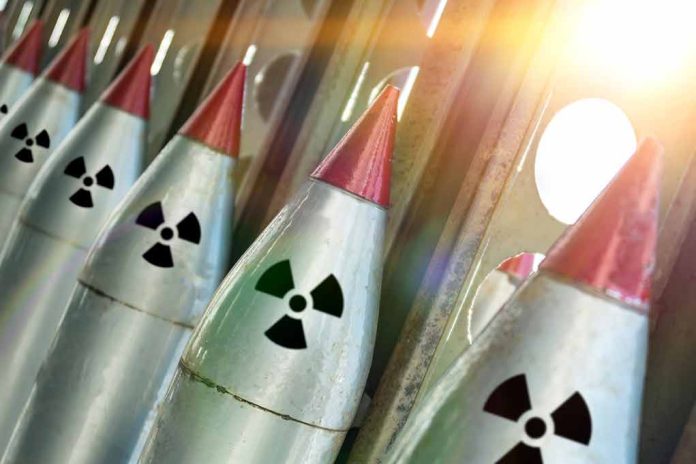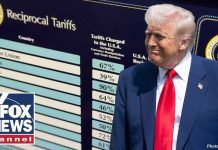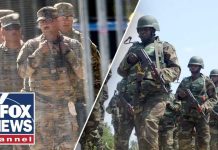
Russia’s top security official Sergei Shoigu raises the specter of World War III while threatening nuclear retaliation against any Western nation deploying troops to Ukraine.
Key Takeaways
- Sergei Shoigu, former defense minister and close Putin ally, warns that Western “peacekeepers” in Ukraine could trigger World War III and prompt nuclear retaliation.
- Russia updated its nuclear doctrine in November 2024, specifically reserving the right to use nuclear weapons if aggression is directed against Russia or Belarus.
- Shoigu claims Europe is actively preparing for war with Russia by 2030 while suggesting Ukraine is being exploited for its mineral resources.
- Despite aggressive rhetoric, Shoigu simultaneously signals Russia’s conditional willingness to resume nuclear arms control talks with the United States.
- Former Russian President Dmitry Medvedev has issued separate threats of nuclear retaliation against countries supporting the ICC’s arrest warrant for Putin.
Nuclear Threats Escalate Over Western Intervention
Sergei Shoigu, newly appointed secretary of the Russian Security Council and longtime Putin confidant, has ramped up nuclear rhetoric amid discussions of Western peacekeeping forces in Ukraine. Shoigu specifically targeted proposals from French President Emmanuel Macron and other NATO allies, suggesting that any deployment of foreign troops would cross a red line for Moscow. This warning comes as Russia faces continued pressure over its military operations in Ukraine, now entering its third year.
The Russian security chief emphasized that Moscow has formalized its nuclear posture through recent policy changes. “In November 2024, revisions were introduced to the Basic Principles of State Policy of the Russian Federation on Nuclear Deterrence, according to which Russia reserves the right to use nuclear arms in the event of aggression against it or the Republic of Belarus, including with the use of conventional weapons,” Shoigu stated, highlighting the expanded conditions under which Russia claims justification for nuclear weapon deployment.
Claims of European War Preparations
In statements that echo Cold War tensions, Shoigu accused European nations of actively preparing for a direct military conflict with Russia. “An undisguised campaign is unfolding in Europe to prepare for a military conflict with the Russian Federation. Possible timeframes for such a clash are being announced at various levels—from three to five years. As early as 2030, European politicians and the military want to be ready to fight us,” he declared, portraying Russia as the target of Western aggression rather than the aggressor in Ukraine.
Shoigu also said, “Sensible politicians in Europe understand that the implementation of such a scenario [putting Western troops on the ground in Ukraine] could lead to a direct clash between NATO and Russia and subsequently to World War Three.”
Shoigu’s warnings included references to Russia’s preparations for possible nuclear tests in the Arctic, reminiscent of Soviet-era atomic demonstrations. He questioned the true intentions behind any Western peacekeeping mission, suggesting they would simply be NATO forces in disguise. “Where will these ‘peacekeepers’ come from? They will be units of the same NATO countries, against the presence of which Russia opposed even before the [war],” Shoigu said, maintaining Russia’s narrative that NATO expansion triggered the invasion.
Resource Control and Economic Claims
Beyond military threats, Shoigu introduced economic dimensions to Russia’s opposition to Western intervention. He claimed foreign troops would actually aim to control Ukraine’s valuable mineral deposits rather than maintain peace. References to Ukraine as belonging “to historical Russian lands” reinforced the Kremlin’s territorial claims that have underpinned its military campaign. Simultaneously, Shoigu suggested Ukraine faces imminent economic collapse, arguing that European nations cannot sustain their current levels of support.
According to Shoigu, “Russia reserves the right to use nuclear weapons in the event of aggression against it or the Republic of Belarus, including with the use of conventional weapons.”
Despite the confrontational rhetoric, Shoigu surprisingly opened a potential diplomatic path forward. He indicated Russia’s willingness to resume nuclear arms control discussions with the United States under certain conditions, after previously suspending participation in the New START treaty. This dual approach of threats and conditional diplomatic openings suggests Russia may be positioning itself for potential negotiations with the next U.S. administration while maintaining a posture of strength through nuclear deterrence.
Sources:
- https://www.express.co.uk/news/world/2045841/russia-sends-horror-nuclear-warning
- https://www.irishstar.com/news/us-news/russia-nuclear-war-ww3-ukraine-35110688
- https://www.newsweek.com/shoigu-putin-ukraine-rare-earths-2063492



